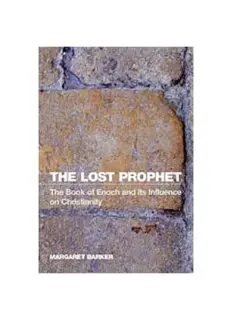
The Lost Prophet: The Book of Enoch and Its Influence on Christianity PDF
Preview The Lost Prophet: The Book of Enoch and Its Influence on Christianity
THE LOST PROPHET BY THE SAME AUTHOR The Older Testament The Gate of Heaven The Great Angel On Earth as it is in Heaven The Risen Lord The Revelation of Jesus Christ The Great High Priest Temple Theology An Extraordinary Gathering of Angels THE LOST PROPHET The Book of Enoch and its Influence on Christianity Margaret Barker Sheffield Phoenix Press Copyright © Sheffield Phoenix Press 2005 First published by SPCK 1988 Reprinted by Sheffield Phoenix Press 2005 Sheffield Phoenix Press Ltd Department of Biblical Studies, University of Sheffield Sheffield S102TN UK www.sheffieldphoenix.com All rights reserved. No part of this publication may be reproduced, or transmitted in any form or by any means, electronic or mechanical, including photocopying, recording or any information storage or retrieval system, without the publisher's permission in writing. British Library Cataloguing in Publication Data A catalogue record for this book is available from the British Library Printed by Lightning Source UK Ltd ISBN 1-905048-18-1 Contents Note: Non-Biblical books ix Introduction I i The Lost Prophet 5 2 The Book of Enoch 16 3 The Origin of Evil 33 4 The Vision of God 49 5 The Parables 65 6 The Cosmic Covenant 77 7 The Son of Man 91 Postscript 105 Index 114 In Memory of Roger Cowley who died on 5 April 1988 The Prophet With fainting soul athirst for Grace, I wandered in a desert place And at the crossing of the ways I saw the sixfold seraph blaze; He touched mine eyes with fingers light As sleep that cometh in the night: And like a frightened eagle's eyes, They opened wide with prophecies. He touched mine ears, and they were drowned With tumult and a roaring sound: I heard convulsion in the sky, And flights of angel hosts on high, And beasts that move beneath the sea, And the sap creeping in the tree. And bending to my mouth he wrung From out of it my sinful tongue, And all its lies and idle rust, And twixt my lips a-perishing A subtle serpent's forked sting With right hand wet with blood he thrust. And with his sword my breast he cleft My quaking heart thereout he reft, And in the yawning of my breast A coal of living fire he pressed. Then in the desert I lay dead, And God called unto me and said: 'Arise, and let my voice be heard, Charged with my will go forth and span The land and sea, and let my word Lay waste with fire the heart of man.' A. S. Pushkin tr. Maurice Baring in Have You Anything to Declare? (Heinemann 1936) Note: Non-Biblical Books This is a short but inaccurate title to describe the less well-known texts mentioned in this book. Several of the texts mentioned below are, or have been, biblical. Some are now classed as apocryphal, or deutero- canonical. Others are pseudepigraphical, and can be read in any of the collections of texts listed on p. 15. The Odes of Solomon (not to oe confused with the Psalms of Solomon) is an early Christian hymnbook from the end of the first century. The Odes have many Jewish features (as does Christianity!), and it is not certain whether they were originally Jewish or Christian. The most complete version has survived in Syriac, but there are some in Coptic and one in Greek. The Ascension of Isaiah is another text of unknown origin which probably had a Jewish core and was expanded by Christian writers. It tells of the martyrdom of Isaiah in the time of the evil king Manasseh (2 Kings 21.1—18) and of his visionary ascent through seven heavens to the great throne of God. The book gives a valuable picture of Christian belief at the end of the first century; it has survived com plete in Ethiopic, and in fragments in Greek, Latin, Coptic and Old Slavonic. Jubilees is a rewriting of Genesis, and takes its name from the author's way of reckoning time in Jubilees, periods of forty-nine years. He writes to show that the Law of Moses was observed even before the time of Moses, and that the patriarchs kept even the later, non-biblical expansions of the Jewish Law. It survives in Ethiopic, and there are Latin fragments. Several manuscripts in fragment form have also been found at Qumran, suggesting a date in the early or middle second century BC. The Testaments of tfie Twelve Patriarchs are the 'death-bed' speeches of each of Jacob's twelve sons, the patriarchs of the tribes of Israel. They warn their descendants of future evils, and exhort them to an upright ix
